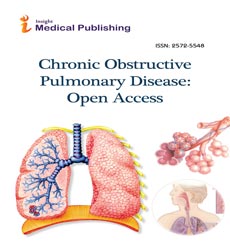Abstract
Hospital Frailty Risk Score Predicts Outcomes in Chronic Obstructive Pulmonary Disease Exacerbations
Introduction Patients with chronic obstructive pulmonary disease (COPD) are at high risk for frailty and prone to complications after admission for an acute exacerbation. We aim to investigate the association between frailty risk and functional outcomes in patients with acute exacerbations of COPD, using a nationwide database. Methods This retrospective cohort study included patients with acute exacerbations of COPD who were admitted by ambulance. We assessed frailty using the Hospital Frailty Risk Score (HFRS) and compared the outcomes between low frailty risk (HFRS < 5) and frailty at risk (HFRS ≥ 5) groups. The primary outcome was prolonged hospitalization (≥30 days). The secondary outcomes were in-hospital mortality, readmission (≤90 days), poor activities of daily living (ADL) at discharge, and difficulty in returning home. Results There were 3,396 eligible patients (mean age, 75.9 ± 11.2 years; 20.4% female). The rate of frailty at risk patients was 14.0%. Frailty at risk patients were significantly higher rates of prolonged hospitalization (32.9% vs. 17.5%), more in-hospital mortality (16.4% vs. 12.5%), more difficulty in returning home (34.6% vs. 22.9%), and poorer ADL at discharge (8.7% vs. 12.4%) than those of low frailty risk. Multivariate analysis with adjusted covariates showed that HFRS was independently associated with prolonged hospitalization (odds ratio, 2.0; 95% confidence interval, 1.4–2.9). Conclusions HFRS can be used to predict the outcome of patients with acute exacerbations of COPD. This finding supports the validity of using the HFRS in clinical practice with patients with acute exacerbations of COPD.
Author(s): Ankur Gupta
Abstract | Full-Text | PDF
Share this

Awards Nomination
Google scholar citation report
Citations : 130
Abstracted/Indexed in
- Google Scholar
- China National Knowledge Infrastructure (CNKI)
- Publons
- Geneva Foundation for Medical Education and Research
- Secret Search Engine Labs
Open Access Journals
- Aquaculture & Veterinary Science
- Chemistry & Chemical Sciences
- Clinical Sciences
- Engineering
- General Science
- Genetics & Molecular Biology
- Health Care & Nursing
- Immunology & Microbiology
- Materials Science
- Mathematics & Physics
- Medical Sciences
- Neurology & Psychiatry
- Oncology & Cancer Science
- Pharmaceutical Sciences

